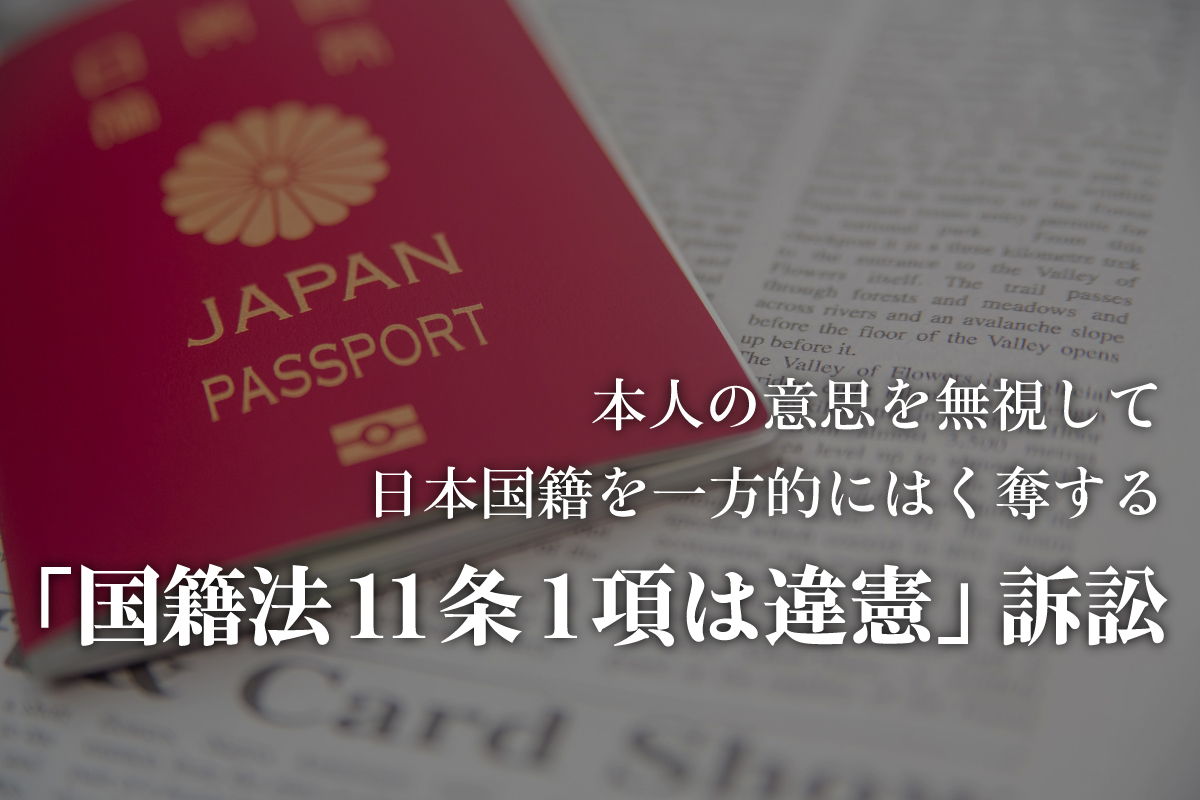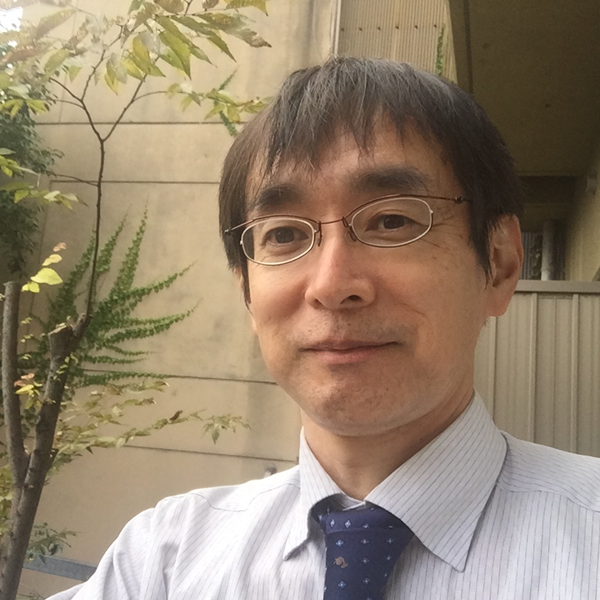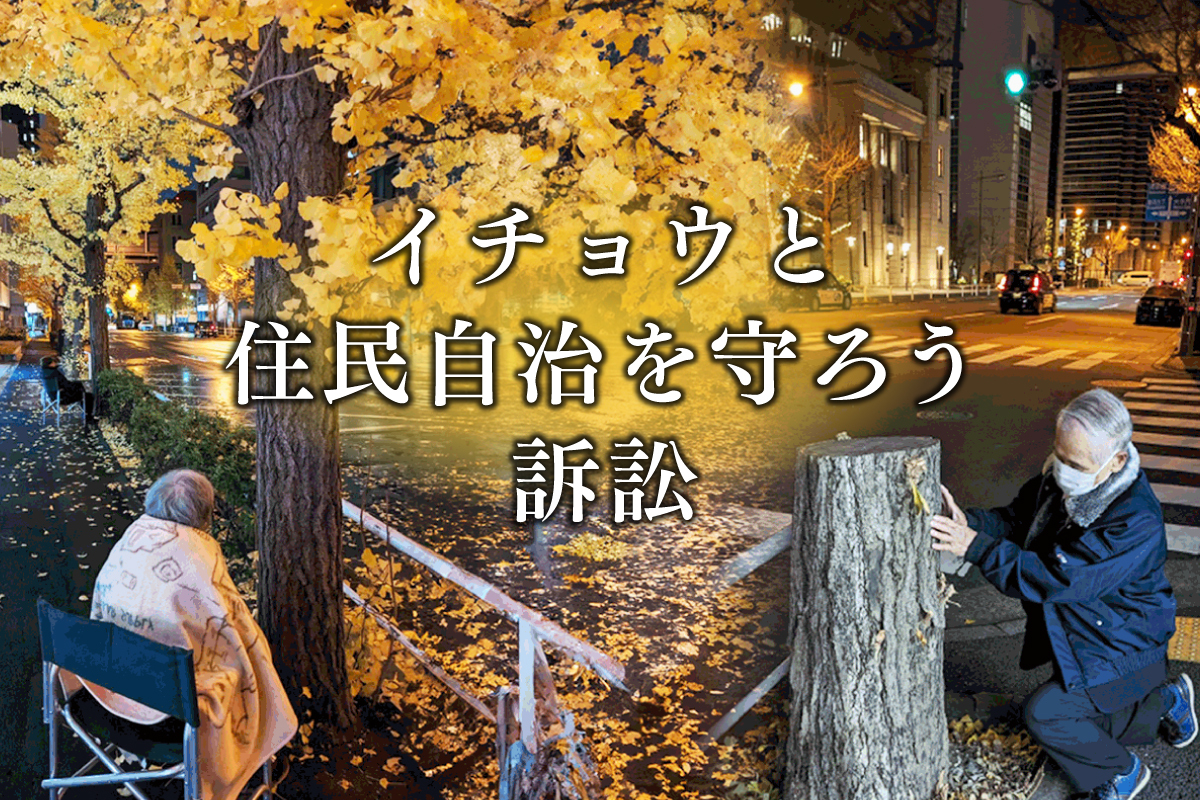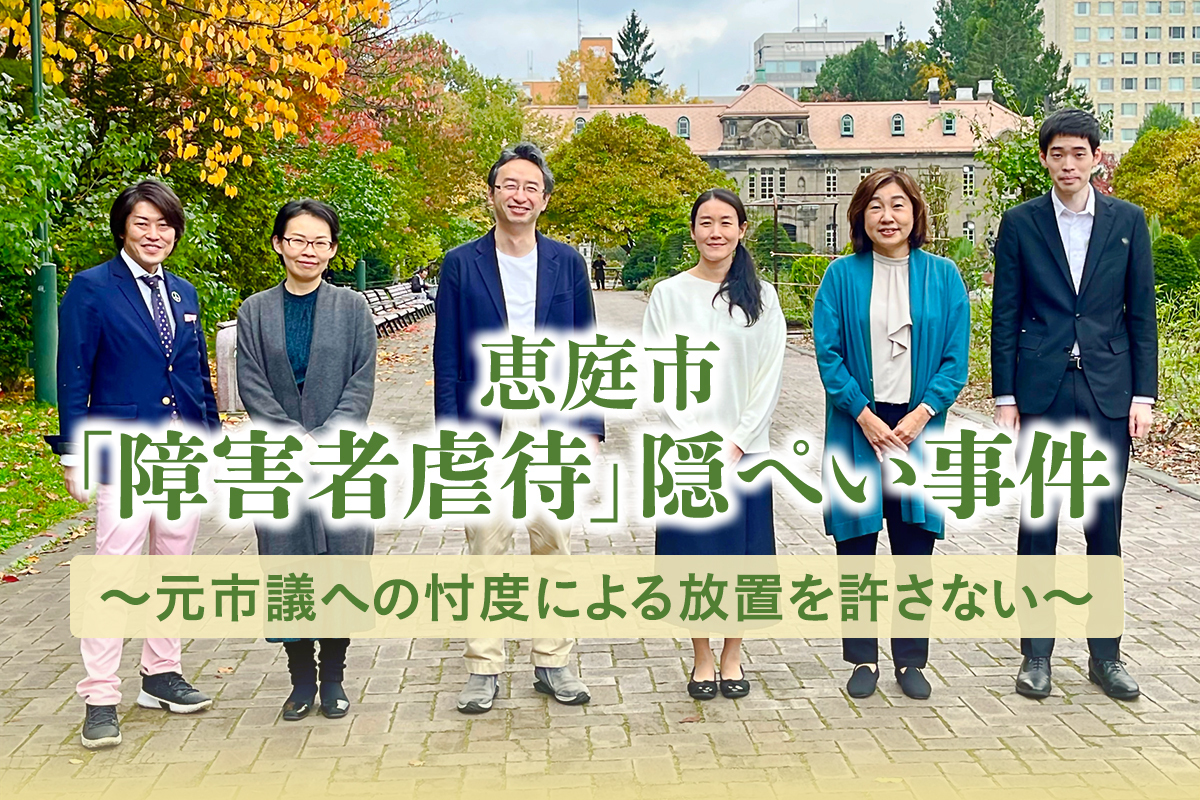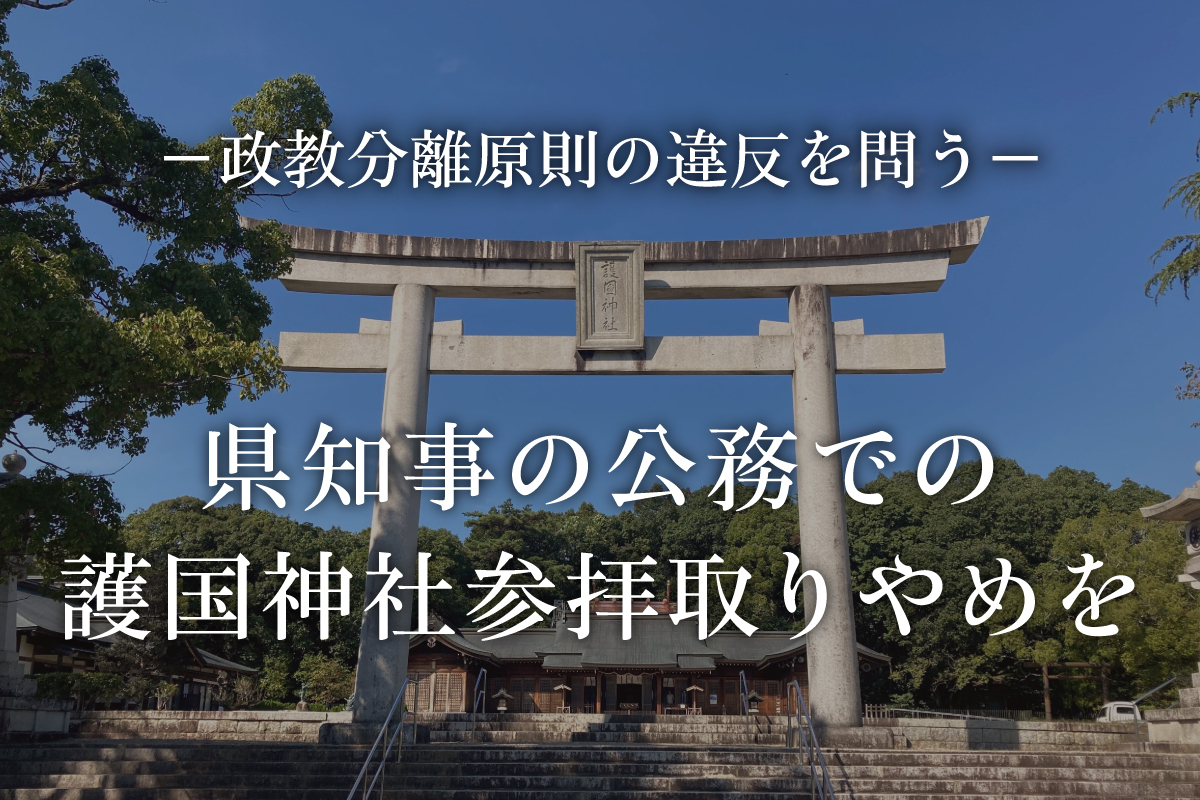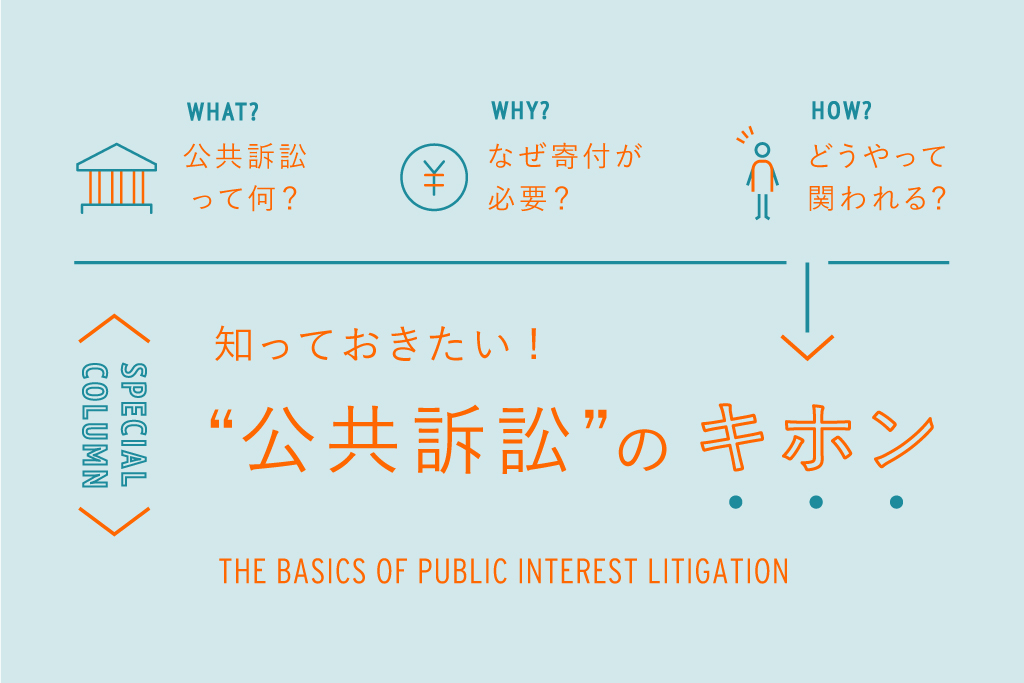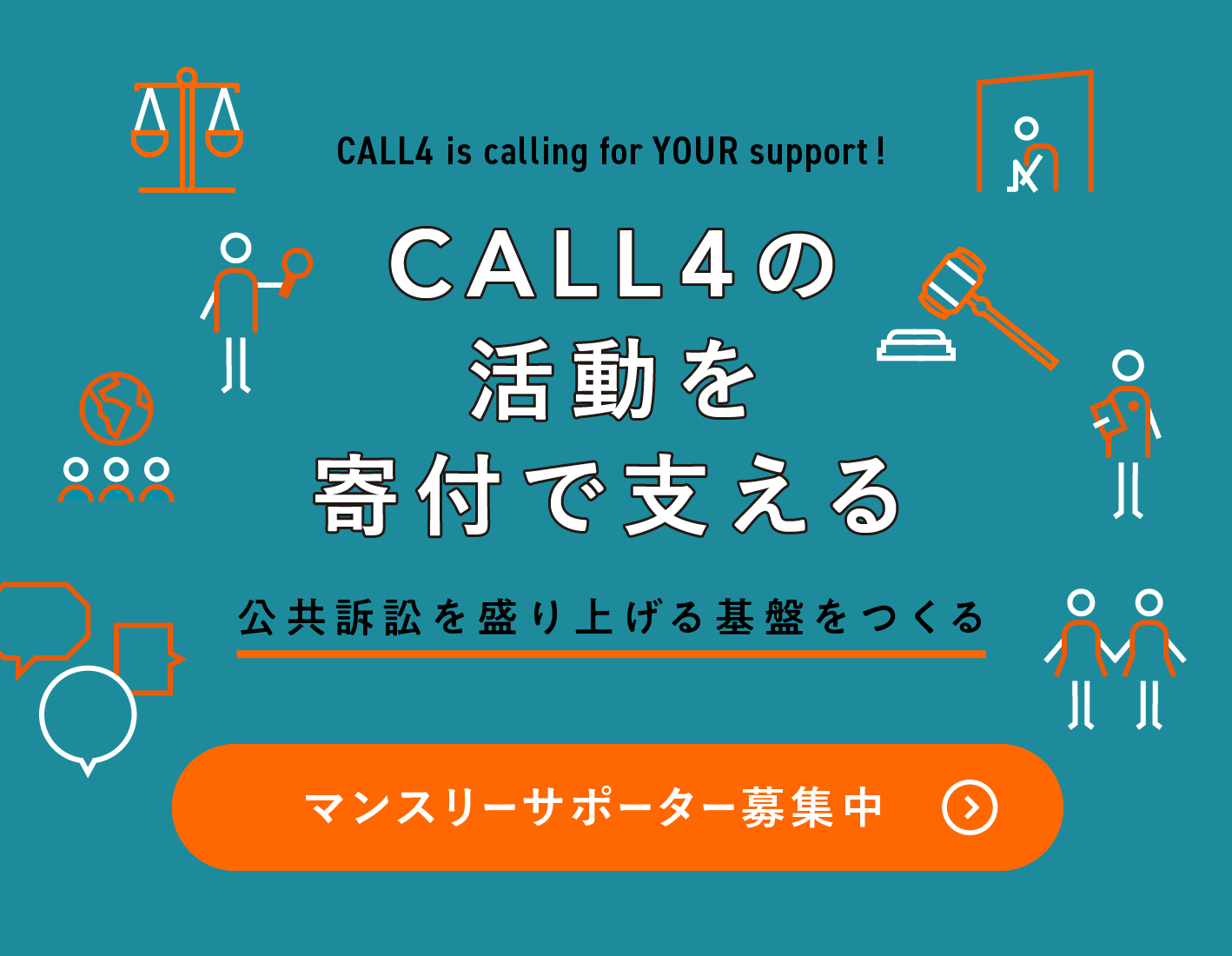どのような事件か
―私たちの意思を無視して、日本国籍を勝手に奪わないで-
国籍法11条1項は、「日本国民は、自己の志望によつて外国の国籍を取得したときは、日本の国籍を失う」と定めています。この条項は、外国籍を取得すると自動的に日本国籍がはく奪されてしまうというものです。日本で生まれ育った日本人であっても、外国籍を取得すると日本国籍を失ってしまうことを意味しています。
本訴訟の原告は、いずれも、国籍法11条1項によって自分の意思と無関係に日本国籍を喪失させられた、元日本国籍保有者です。
原告が立ち上がった経緯
訴訟1・原告近藤ユリさんについて
原告の近藤ユリさんは、日本人の両親のもと日本で生まれ育ちました。その後、米国の大学院に進学し、米国で弁護士となりアメリカのアリゾナ州で暮らしていました。ユリさんは、長くアメリカで暮らすうちに大統領選での選挙権を行使したいと考えるようになり、また税制上不利にならないためにも、アメリカ国籍の取得を希望するようになりました。その当時のユリさんには、日本国籍を失ってもよいという考えはみじんもなく、アメリカ国籍を取得することで日本国籍を喪失することになるとは思ってもいませんでした。
ユリさんは、日本人としてのアイデンティティを誇りに思い、大切にしています。そして、日本にいる親族との交流も大切にしており、老後は日本に戻って親戚の近くで暮らしたいと考えていました。
コロナ禍での日本への入出国に際して、ユリさんは、日本国籍喪失の問題に直面しました。国籍法11条1項の適用により日本国籍を喪失していたユリさんは、入国制限が厳格化する中で、いったん日本を出てしまうと、次にいつ日本に入国できるかわからないという状況におかれてしまったのです。結局ユリさんは、日本への入国制限を避けるため、日本にとどまることを選びました。しかし、国籍法11条1項が存在しなければ、ユリさんがこのような選択を迫られることはありませんでした。
長年アメリカで弁護士として働いてきたユリさんのところには、ユリさんと同じような境遇に悩んでいる人たちからの相談が後をたちません。コロナ禍で、今まで以上に問題は深刻化しています。
実際、日本国籍がないため日本への入国や長期滞在が難しくなり、親の介護のために帰国しても十分な期間滞在ができなかった人たち、親の死に目に会うことができなかった人たちがたくさんいます。
「私は、日本国民の一人として、外国国籍を取得したからといって先祖代々暮らしてきた土地に自由に帰ったり暮らしたりできなくする法律はおかしいと考えています。また、アメリカで弁護士をする中でも、これまで国籍法11条1項により日本国籍を喪失した人たちの相談を数百件も受けてきました。これらの人たちの声を日本国内に届けたいと思い、今回提訴を決意しました。」
訴訟2 ・原告Aさん(仮名)について
Aさんは、2010年代の初め頃、日本国籍を有する親の子として生まれ、日本国籍を取得しました。その後、Aさんは、日本国籍の女性と英国籍の男性の夫婦と特別養子縁組を結び、夫婦の子となりました。
両親は、Aさんが特別養子縁組によって実子と同じ立場になったことから、Aさんがもともと持っていた日本国籍に加え、父の国籍である英国籍も得たものと考えて、在日英国領事館でAさんの英国旅券申請をしました。これに対して、領事館の担当者は、旅券申請をする前に英国の市民登録をする必要があると説明しました。
Aさんの両親は、Aさんにはすでに英国籍があるものの、英国政府に届出をしていないためにAさんを英国国民として把握していないから、市民登録が必要なのだと考え、Aさんの市民登録を申請し、数ヶ月後に登録されました。その後、Aさんの両親はAさんの英国旅券を申請して交付を受けました。
Aさんが英国旅券を取得した後、父の米国転勤に伴い家族は米国に移住し、その後、シンガポールに転居しました。シンガポール在住中Aさんの日本旅券を更新した際、Aさんの両親はAさんが英国旅券も持っていることを話しましたが、大使館職員は、成人後の国籍選択についてしか説明しませんでした。
2010年代後半、Aさん一家は父の母国である英国に移住し、その後現在までロンドンに住んでいます。
コロナ禍が発生し日本へ帰国ができない期間が続いたため、Aさんの日本旅券の有効期限が経過してしまいました。そこで、2022年に、両親は、在英日本領事館に行き、Aさんの日本旅券の再発行を申請しました。ところが、領事館からAさんの国籍取得証明書を確認したいと連絡があり、両親は、Aさんは国籍法11条1項によって日本国籍を喪失している、と説明されました。Aさんの両親は、その時はじめて、日本で行った英国の市民登録の手続が英国籍の取得手続であり、その手続以降は日本国籍を失ったものとして扱われることを知りました。
こちらの訴訟では、原告がそもそも外国国籍を志望取得したといえるのかなどが争われています。

問題の所在
1.日本国籍を保持する権利(日本国籍を奪われない権利)を憲法は保障しているのではないのか
国籍は個人のアイデンティティの根幹に関わる事柄です。先祖や親族との世代や空間を超えた親密なつながりを象徴し、自分が自分であり続けるために必要なかけがえのない絆です。
そして、国籍は特に在外国民にとって重要な意味を持ちます。外国に居住している日本国民の多くは、外国で「外国人」として暮らす体験を通して、日本とのつながりが自分にとっていかに大切なものであるのかを折に触れ強く意識するようになるからです。外国に居住する日本国民にとって、国籍は日本とのつながりの証であり保証でもあるのです。
このように、国籍は、一人ひとりが幸福を追求していくうえで極めて重要な法的地位であり、本人の意思に反して日本国籍をはく奪することは、基本的人権の尊重を定めた憲法13条の理念にも反するものです。憲法22条2項も日本国籍を離脱しない自由及び日本国籍を保持する権利を保障しています。
本件の原告たちは、日本国籍を奪われたことで、自分の大切な何かがえぐりとられたような痛みを感じ、遠く離れても日本を思いつづけ、日本で暮らす親族や友人たちとのつながりを大切にし、日本国、そして日本社会の一員、同じ仲間であり続けたという自身のアイデンティティそのものが奪われてしまう苦しみを感じています。
2.グローバル社会や諸外国の現状と合っていないのではないか
外国で暮らす人にとって居住国の国籍を取得することには大きなメリットがあります。
たとえば仕事の機会が広がったり、居住国で受けられる社会保障が厚くなったり、自分の生活に大きな影響を与える政策決定に参加できるようになります。国際カップルの場合は配偶者や子どもと同じ国籍を持つことになり、海外旅行や海外赴任の時に家族が一体となって移動できるようになります。万が一国際紛争が生じたときにも、家族の国籍が一つであれば家族離散のおそれを小さくできます。また、もし離婚に至った場合にも、居住国の国籍があれば親権争いで不利になることも避けられます。そして、何よりも大きいのが、在留資格の不安定さに悩まされず存分に力を振るえるようになり、生活基盤や経済基盤を強化しやすくなることです。生活・経済基盤が強くなれば、日本で暮らす老親を支えることも容易になります。
在外国民にとって居住国の国籍を取得することにはこのような大きなメリットがあることから、在外国民の生活を応援しようとする多くの国々は、在外国民が居住国の国籍を取得しても元の国籍を失わないですむ制度を持つようになってきました。そのような国は増えつづけており、2020年には世界の76%(アジア地域でも65%)に達しています。(Vink, Maarten; De Groot, Gerard-Rene; Luk, Ngo Chun, 2015, “MACIMIDE Global Expatriate Dual Citizenship Dataset”, doi:10.7910/DVN/TTMZ08, Harvard Dataverse, V5 [2020].)
2021年の統計では外国で暮らす日本国民は130万人を超え、その約60%が長期滞在者、約1.5%が永住者であると推計されています。また、婚姻全体に占める国際結婚の有合は、1965年から2021年まででは2.75%でしたが、2012年から2021年までは3.4%となっています。今や日本国民の生活や家族関係が容易に国境を越える時代なのです。(外務省:海外在留邦人数調査統計、厚生労働省:人口動態統計年報 主要統計表)
3.複数国籍の発生防止は日本国籍はく奪を正当化できるのか
国籍法11条1項の立法目的は複数国籍の発生防止だといわれています。
たしかに外国籍を取得した人が日本国籍を持ちつづけると複数国籍になります。
しかし、外国籍を取得した人が日本国籍を持ち続けても弊害はありません。
憲法は日本国民が外国籍をあわせて持つことを禁止していませんし、日本の国籍法でも出生や日本への帰化などで生じる複数国籍は実際上生涯保持できるものとなっています。
外国籍を志望により取得した場合の複数国籍に限って徹底して発生を防止するのは不合理というほかありません。
訴訟を通して実現したいこと
この訴訟の原告のように、国籍法11条1項により、外国籍を取得する際に日本国籍を失うことになっても良いかの意思確認もされずに、自動的に日本国籍をはく奪されてしまった人たちが世界中にたくさんいます。
日本国内で国際カップルから生まれた子どもが、この条項により日本国籍を失うケースも多数起きていますし、海外へ渡った家族や親戚、友人たちが、国籍法11条1項によって日本国籍をはく奪され、日本への帰国を妨げられるようになる可能性があります。
原告らは、自分たちだけではなく他のたくさんの人たちの声も代弁し、国際化が進んだ社会で、自分たちの意思と無関係に日本から排斥される人たちがでてくるのはもう終わりにしたいと考えています。
本訴訟の位置づけ
国籍法11条1項をめぐって、すでに以下の2つの訴訟が提起されていました。
2018年、ヨーロッパ在住の原告8名が、同条項が違憲無効であることを主張して東京地裁に提訴しました。2021年1月21日、東京地裁は原告らの請求を退けて、2023年2月21日、東京高裁も請求を棄却しました。審理は最高裁へ進んでいます。
また、2016年、旧ロシア国籍法の適用に関する訴訟が東京地裁に提訴され国籍法11条1項の違憲性が争われましたが、2021年2月18日に東京地裁(上記訴訟と同じ裁判体でした)、2022年11月10日に東京高裁が原告の請求を退け、原告が上訴せず判決が確定しました。
そのような中で今回新たに提起した2つの訴訟には、上記の2つの訴訟とは異なる新しい争点があります。
米国国籍を取得した女性の訴訟では、必要な書類を整えて行った旅券更新申請が拒否されたことの違法性や、国民に重大な不利益をもたらす国籍はく奪条項の存在を国が国民に周知してこなかった不作為の違法性などが、英国国籍を志望取得したとされた子どもの訴訟では、原告がそもそも外国国籍を志望取得したといえるのか、法定代理人による外国国籍取得に国籍法11条1項が適用されるのか、適用することは憲法14条1項(平等原則)に違反するのでないか、などが争点になります。
資金の使途
- 外国法調査費用、翻訳費用
- 研究者、専門家の意見書作成、出廷費用
- 弁護士交通費、通信費、コピー代など
- 期日報告集会会場使用料
※上記費用に計上した上でお金が余った場合には、弁護士費用に充てさせていただきたいと思います。
担当弁護士のメッセージ
弁護士 近藤 博徳:
かつて、私にとって国籍は、空気ほどの存在感も感じることのないものでした。
国籍法11条1項の裁判に関わるようになって、もう9年も経ちます。この間、日本国内にいながら日本国籍を失った方、海外に住んでいて日本国籍を失った方、国籍を失ったことを知らずに日本に帰国して不法滞在外国人となってしまった方、また海外に住んでいるが日本国籍を失いたくないために現地に帰化できず困難に直面している方、多くのお話を聞き、ケースを見てきました。
いま、私は、ヒリヒリする生傷のようなリアルさで国籍を実感している人が、世界中にいることを知っています。彼ら・彼女らの重荷が、少しでも軽くなり、その住む土地で自らを思う存分実現できるようになること、そしてかつての私のような人たちに、国籍の問題がもたらしているリアルな痛みを知ってもらうこと、を期待して、裁判に取り組んでいます。
弁護士 仲 晃生:
訴訟1の原告近藤ユリさんとは、2018年に提訴した国籍はく奪条項違憲訴訟の報告集会で知り合いました。その後、ユリさんから、コロナ禍で起きている悲劇的な状況を日本国内で暮らす人たちに知ってもらうためにも訴訟を提起したいという相談を受け、受任しました。
この訴訟で重要な点はいくつもありますが、私個人としては、第1に、日本国民が海外で居住国の国籍を取得して生活の安定や活躍の場の拡大を目指すことを応援するための訴訟であるということ、第2に、今の憲法をどうやって解釈すべきなのか、今の憲法の下で裁判所はどういう役割を課されており国民と政府の関係をどう考えるのか、憲法は日本国籍を本人の意思に反して奪い民主政治の過程から日本国民を追放することを許容しているのかなど、今の憲法の下での国民と国家の関係をどう考えるかということ、これら2点が、結論を左右する核心であると考えています。
訴状では、国籍はく奪条項違憲訴訟で練り上げてきた主張をさらにわかりやすく整理して、この問題意識も盛り込んでみました。国の反論と読み比べて、考察いただければ幸いです。
担当弁護士の紹介
・近藤 博徳 東京弁護士会 TOKYO大樹法律事務所
・椎名 基晴 京都弁護士会 椎名法律事務所
・仲 晃生 京都弁護士会 椎名法律事務所
・仲尾 育哉 大阪弁護士会 C&L法律事務所
・山西 信裕 福岡県弁護士会 冨山・松尾・山西法律事務所
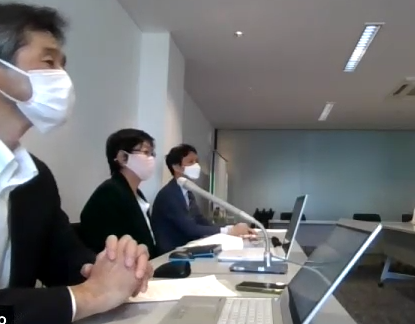
寄付のお願い
みなさまのご寄付が原告や代理人弁護士が活動を継続していく大きな力になります。日本に暮らしているあなたも私も、明日には他人事ではなくなるかも知れない国籍剥奪条項。その廃止へ向けて、是非ご協力ください。
署名運動へのご協力のお願い
change.orgにて、【日本人が外国籍を取得した際、日本国籍を保持するか放棄するか選べるようにするため、私たちの運動を応援してください】という国籍法11条1項改正の署名運動も行っております。ぜひご協力ください。ご署名はこちら からお願いいたします。
What are the major problems?
(N.B.: in Japan, deprivation of nationality does not make the person stateless in most cases so the human right issue of statelessness is not discussed here)
1) Arbitrary deprivation of nationality might violate the right to nationality protected under the Constitution of Japan
Article 13 of the Constitution of Japan protects the “right to life, liberty, and the pursuit of happiness”. It could function as an equivalent of the 14th amendment in the U.S. to protect new human rights that are not foreseen and explicitly mentioned in the Constitution. Nationality symbolizes one’s connection to its homeland, ancestors and families, which consist of the core of individual identity. Arbitrary deprivation of nationality can substantially harm the integrity of one’s identity, which should be protected by Article 13.
2) Individual interest in dual citizenship VS state interest in banning dual citizenship
In a nutshell, there is barely any state interest worth balancing here. In contrast, the individual interest in holding multiple citizenships is crucial and substantive.
By acquiring the nationality of their residing countries, Japanese residing abroad can participate in elections and have broad access to job opportunities and the welfare system. For Japanese who marry foreigners, acquiring the partner’s country’s citizenship can allow the families to travel between Japan and other countries together without dealing with the complicated visa matter. Dual citizenship is also crucial in guardianship and family separation in emergent situations.
3) Japan is still belongs to the 23% country where right to nationality is not properly recognized
Given the balancing above, there is no surprise that 76% of all the countries allow dual citizenship (65% for Asian countries) (Vink, Maarten; De Groot, Gerard-Rene; Luk, Ngo Chun, 2015, “MACIMIDE Global Expatriate Dual Citizenship Dataset”, doi:10.7910/DVN/TTMZ08, Harvard Dataverse, V5 [2020].)
Considered by many as a country with little human right violations, Japan is not doing well in guaranteeing this right to nationality, and the government does not provide a convincing justification.
As a result, multiple litigations are filed all over in Japan to challenge the constitutionality of this law.
Case 1:
Yuri Kondo was born and raised in Japan, went to law school in the U.S. and became an attorney in Arizona. She acquired U.S. citizenship because she wanted to participate in the presidential election in the U.S. and to avoid any disadvantageous treatment in taxation. At that time, she was not aware that she would lose her Japanese citizenship by doing so.
However, Yuri also cherishes her Japanese identity, and has always kept close connections with her families and relatives in Japan. She also planned to move back to Japan to live close to them after she gets old.
With Covid-19 and the increasingly restricted entry policy, the problem becomes more serious and imminent. Basically, Japanese like Yuri, who have lost Japanese citizenship,cannot leave Japan due to the hardship of returning without a Japanese passport. To avoid uncertainty, Yuri chose to stay in Japan.
Many Japanese abroad face similar problems but there is no way out as long as Article 11(1) is in effect. Therefore, Yuri filed a case to challenge the validity of the law.
“I, as a Japanese citizen, think that the law should not limit people’s freedom to go back and live in their home country just because they acquired a foreign citizenship. Through working as a lawyer in the U.S., I have had hundreds of clients who lost their Japanese citizenship because of Article 11(1). I have decided to file a case to bring the voices of these people to Japan.”
Case 2:
Plaintiff A was born in 2010 by parents with Japanese nationalities, thereby acquiring the Japanese nationality. Later, Plaintiff A became an adopted child of a Japanese mother and a British father. As a proof of his British nationality, Plaintiff A registered as a British citizen, and then received his British passport.
Plaintiff A moved to Singapore with the family. When Plaintiff A renewed his Japanese passport in Singapore, although the parent told the officer at the embassy that Plaintiff A also holds a British passport, the officer only explained that Plaintiff A has to make a choice among the nationalities once reaching the age of adulthood.
The family currently lives in London. The passport of Plaintiff A expired during the covid-19 period when returning to Japan was hardly possible. In 2022, the parents went to the embassy of Japan in the U.K. to renew the passport of Plaintiff A, but the officer told them according to the Article 11(1) of the Nationality Act, Plaintiff A has lost the Japanese nationality. Only at that moment the parents started realizing that British citizenship registration is regarded as acquisition of British nationality, and Plaintiff A had lost his Japanese nationality at the time of the registration.
Other related cases:
In 2018, eight plaintiffs residing in Europe filed a case to challenge the validity of Article 11(1) of the Nationality Act at theTokyo District Court and appealed after the case was dismissed. The Tokyo High Court also dismissed the case on February 21, 2023. The case is now brought to the Supreme Court.
Another similar case that challenged the constitutionality of the same law was filed in 2016 and was dismissed by the Tokyo District Court in 2021, as well as by the Tokyo High Court In 2022. The plaintiffs in this case did not appeal, and the case was finalized.

New arguments in case 1:
- Rejection of issuing passports regardless of the submission of required documents violates the Constitution.
- The failure of the Japanese government to notify its citizens of the law that deprives nationality violates the Constitution.
New arguments in case 2:
- Article 11(1) shall not be applied when the child does not have an intent to acquire the foreign citizenship.
- Article 11(1) shall not be applied when the foreign citizenship is acquired through a legal agent.
- Application of Article 11(1) to case 2 violates the equality clause of Article 14(1) of the Constitution.
Hopefully these new arguments and the increasing social movement will make the courts decide differently. This will generate a positive impact on many Japanese with foreign roots and foreigners with Japanese connections. Most importantly, we need your support to correct this arbitrary deprivation of nationality in Japan!
Use of fund
The funds collected will be used for case 1 and case 2, specifically in costs of foreign law research, translation, payments to scholars and experts for presenting in court, transportation fees for attorneys, and other necessary logistic expenses. (the attorney fee is not included but if there is any fund left it might go to the attorneys in cases 1 and 2.)

Thank you again for reading this case. If you have any comments or questions, please feel free to leave your comments in your language of choice in the forum section!
Summary of Messages from Attorneys
From Attorney Kondo:
I used to take nationality for granted just like air. However, over the past nine years, I have been working on cases related to Article 11(1) of the Nationality Act, and I got to know all kinds of difficulties faced by those who lost their nationality. Through this litigation, I would like more people to know the pains and difficulties experienced by those deprived of nationality, and would like to alleviate their burdens.
From Attorney Naka:
I met the Plaintiff Kondo Yuri in 2018 and decided to take the case after learning that Yuri wants to file the lawsuit to let Japanese inside Japan know the deplorable situations outside Japan.
I think the following two points are very important among other significant implications of this case. Firstly, this case aims at helping overseas Japanese to expand their level of mobility while maintaining their life stability. Secondly, this case asks the questions of whether the Constitution permits the state to deprive an individual of nationality without consent, and how court should play its role in thinking about the relationship between people and government.
Attorneys in Charge
Hironori Kondo, Tokyo Bar Association, Tokyo Taiju Law Office
Motoharu Shiina, Kyoto Bar Association, Shiina Law Office
Teruo Naka, Kyoto Bar Association, Shiina Law Office
Ikuya Nakao, Osaka Bar Association, C&L Law Office
Nobuhiro Yamanishi, Fukuoka Bar Association, Tomiyama Matsuo Yamanishi Law Office
Join Our Petition
We would appreciate it if you could also join our petition < Help us change the law for Japanese nationals to have a choice to keep or leave their citizenship when obtaining citizenship abroad > on change.org. Please click here.

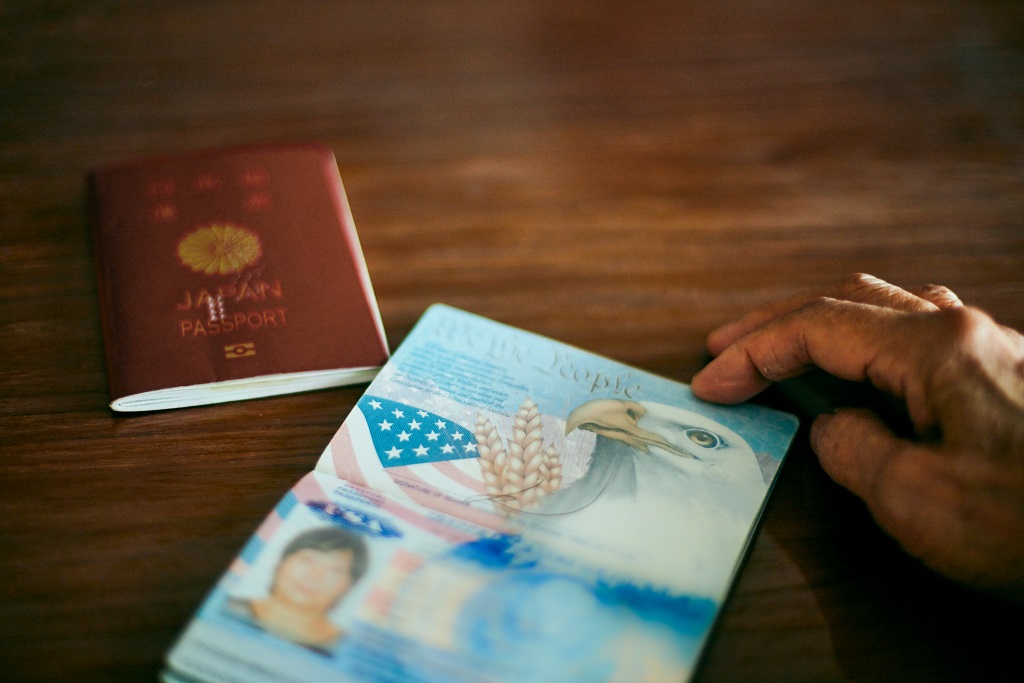 2023. 5. 12「仕事も、家族のあり方も、決めるのは国ではない」日本のパスポート発給を拒否された近藤ユリさんのストーリー2023. 5. 12続きはこちら Click here to read more.
2023. 5. 12「仕事も、家族のあり方も、決めるのは国ではない」日本のパスポート発給を拒否された近藤ユリさんのストーリー2023. 5. 12続きはこちら Click here to read more.
 2023. 5. 12The government cannot decide what my job and family should be likeThe story of Yuri Kondo whose Japanese passport application was denied2023. 5. 12続きはこちら Click here to read more.
2023. 5. 12The government cannot decide what my job and family should be likeThe story of Yuri Kondo whose Japanese passport application was denied2023. 5. 12続きはこちら Click here to read more.